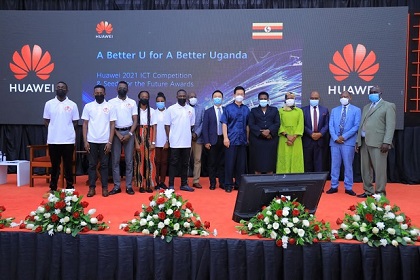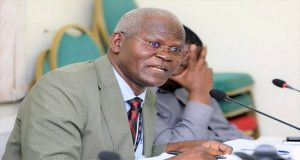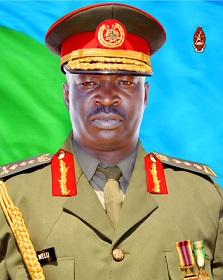
The Huawei global ICT Competition final will be happening this weekend.
Huawei ICT Competition is a competitive ICT talent exchange program developed globally for university, college and TVET students. This aims to promote the healthy development of the ICT talent ecosystem and support the integration of industry and education.
Launched in the African region just six years ago, the Competition has developed into the largest ICT skills competition in Africa and the world at large.
The final will start with an opening ceremony on Friday 17th June 2022, then Saturday 18th June will be the examination day where the exercise will be conducted for five hours (written and lab exam). Uganda students shall battle over 150 teams globally representing over 40 countries.
The results shall come out the following week on Tuesday 21st June.
Uganda is being represented by nine students; six from network track (Makerere University), and three from cloud track (Muni University).
In May, 2022, Huawei, the leading ICT global solutions provider, awarded the 2021 Seeds for the Future Finalists and the 2021-2022 Huawei Regional ICT Competition finalists.
Under the theme of “Connection, Glory, Future”, the nine month long Huawei ICT competition for Sub Saharan Africa was finalized on 19th February, 2022 with over 16 countries and 38 teams sitting for written and laboratory exams. The competition attracted over 15,000 participants from Sub-Saharan Africa from 500 universities.
Globally, the Huawei ICT Competition 2021 covered over 80 countries worldwide, with 150 000 contestants from more than 2,000 universities and colleges.
According to Huawei Uganda Public Relations Director, Mr Gaojian, “Huawei Uganda approached over 15 universities and interested them in the 2021 ICT Competition. We registered 750 students and opened for them our free online learning platforms in the various courses of Network and cloud. The network track consists of Datacom, Security and Wireless Lan while Cloud track consists of Artificial intelligence, Big Data, Cloud Computing and Storage. These studied and were subjected to preliminary exams, national exams and Regional exams where we attained the first and second position.”
Michelle Chemutai, a telecom engineer, at Makerere University and one of the regional level winners, recently expressed her gratitude to the exposure Huawei had accorded to them.
“The competition was very intimidating and at the same time exciting. The thought of competing with creme de la creme teams from different countries was frightening. Taking the first position made me really feel good about myself and increased my self-confidence. Thanks to Huawei,” she said.
She added that, “This competition was a new experience for me as an individual. it taught me team work and coordination and that hard work actually pays off. This competition literally forced us to give in our best. Also, I got a lot of exposure in the network field and learnt how to do the practical lab configurations that isn’t taught at the university.”
LEAP programme:
In April this year, Huawei announced the launch of its LEAP digital skills development programme aimed at helping advance the ICT skills of more than 100,000 people across the Sub-Saharan Africa region within three years, according to the Chinese tech conglomerate.
LEAP – an acronym for Leadership, Employability, Advancement and Possibilities – is aimed at fostering strong digital leadership and a skilled ICT workforce, building a digital talent pool, and promoting digital literacy among citizens. It includes a wide range of activities spanning from ICT training and certification courses to government digital capacity building and ICT skills competitions.
Launching the LEAP programme, Huawei Southern Africa President, Leo Chen stressed the importance of ICT skills transfer and talent development and underlined Huawei’s consistent emphasis on it.
“Digitisation is deeply rooted in people. Because we digitise for people and by people. When roots are deep, there is no need to fear the wind,” he said.
“Through the programme, we strive to cultivate more youth leaders in ICT, who can explore more possibilities for themselves, their families, community and ultimately their nations.”
According to the company, Huawei has, over the past two decades, helped advance the ICT skills of more than 80,000 people across the sub-Saharan Africa region. In doing so, it says it has helped increase youth employability and bridge the gender gap in the ICT industry. Huawei itself is an employer of choice in the region. Its subsidiaries in 9 Sub-Saharan African countries earned the Top Employer seal in 2021.
With a series of talent ecosystem campaigns in Sub Saharan Africa, including the ICT competition, Huawei hopes to skill up more than 700,000 ICT professionals by 2023.






